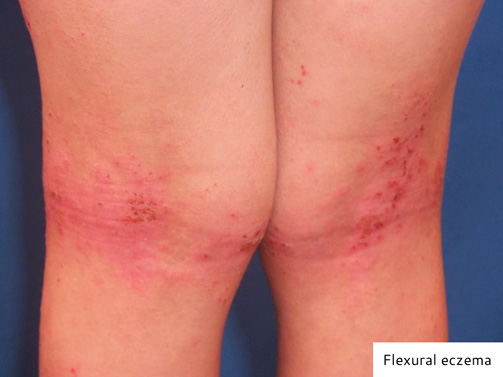WHAT IS ECZEMA?
(Pronounced ek-ze-ma)
Eczema (sometimes called dermatitis) is a medical dry skin condition that can affect people of all ages and skin types.
It is a highly individual condition which varies from person to person and has many different forms. It can be widespread or confined to areas such as the inside of elbows and backs of knees, on the face, or on hands or feet.
Skin with eczema has less natural protective oils. These oils keep water trapped in the skin. Without them water leaves the skin too quickly.
In mild cases of eczema skin can be dry, red, scaly and itchy. However, in dark skin tones, redness may be difficult to see. In severe cases the skin may also crack, bleed and crust over. Because the skin is itchy, scratching can cause more damage to the skin which may mean infection becomes a problem.
Sometimes, eczema can suddenly get very bad and the skin becomes inflamed, red and angry looking. This is known as a ‘flare up’ or ‘flare’. In dark skin, eczema flare-ups tend to look darker brown, purple or ashen grey in colour, rather than red. This might be caused by an irritant, such as soap, or another trigger factor. You should seek medical advice from a GP, nurse or pharmacist in this situation, who can give advice on how to care for skin with eczema.
Atopic eczema, affects about 1 in 5 children in the UK and around 1 in 12 adults in the UK have dry skin or eczema.
Types of eczema (or dermatitis)
There are many types of eczema. Atopic eczema is the most common amongst children. Contact dermatitis which can be caused by reactions to soap, chemicals or metals, such as nickel, often found in jewellery, is more common in adults.
Caring for skin with eczema
Because dry skin is caused by a lack of oils, which allows too much water to leave the skin, it’s important to replace these oils to help trap moisture in the skin. Emollients can help to replace the missing oils. If you have eczema your GP, Nurse or Pharmacist may be able to prescribe an emollient that is most appropriate for you.
Scratching should be avoided, if possible, as it damages the skin even more and sets up a cycle of itching and scratching.
Although there is no ‘cure’ for eczema, children with atopic eczema may often ‘grow out’ of the condition. By carefully looking after the skin and regularly using simple treatments such as emollients or steroids, it is possible to greatly reduce the impact of eczema for most people.
When eczema ‘flares’ the skin can be very red, angry and inflamed. Topical steroids are often used to reduce the inflammation and to help eczema improve. Regular use of emollients can help to increase the time between flare ups and can help reduce the amount of topical steroids required.
For further information about topical steroids, speak to your GP, nurse or pharmacist.
Washing with soap based products removes oil from the skin and can make eczema worse. Soap substitutes are alternatives to soap and contain non-soap cleansers and emollient oils to protect delicate skin.
Click here to see more information about emollients and soap substitutes

The National Eczema Society is a charity dedicated to improving the quality of life of people with eczema and their carers.
Visit www.eczema.org for further information.




